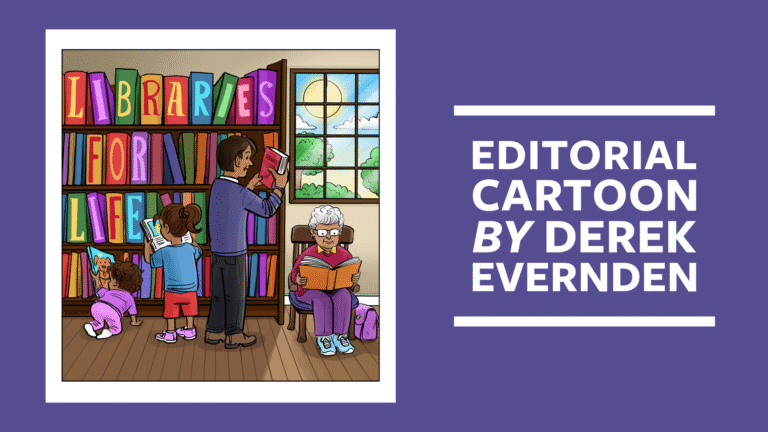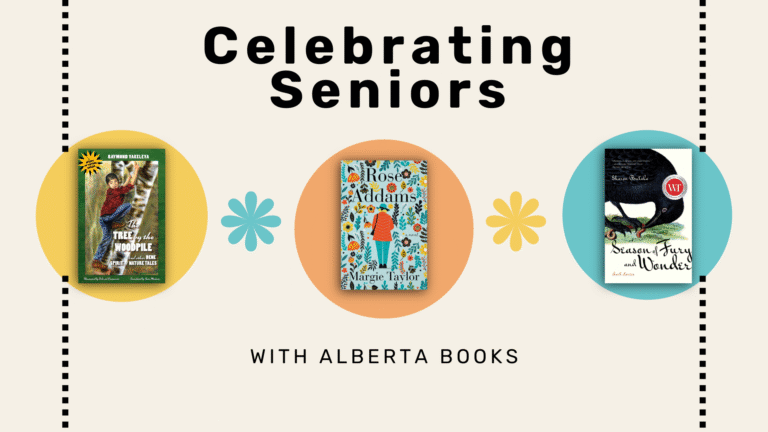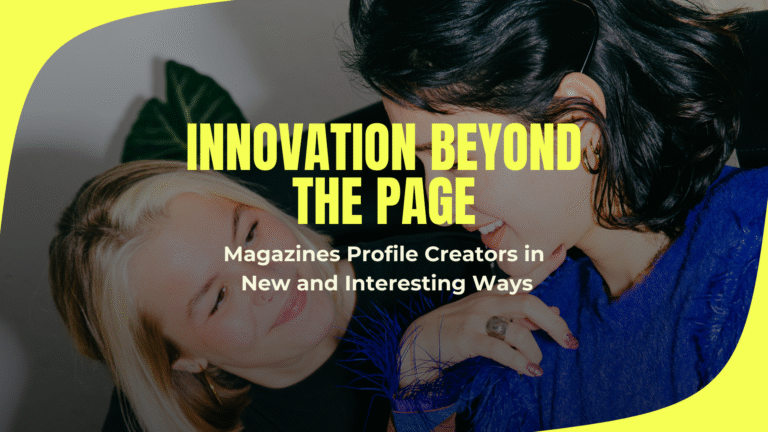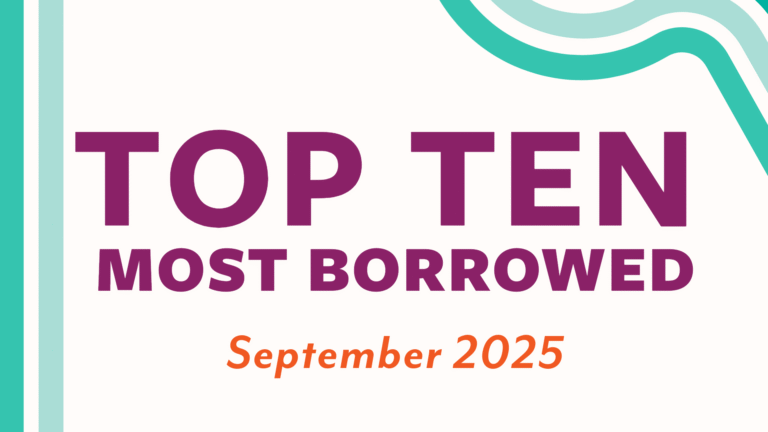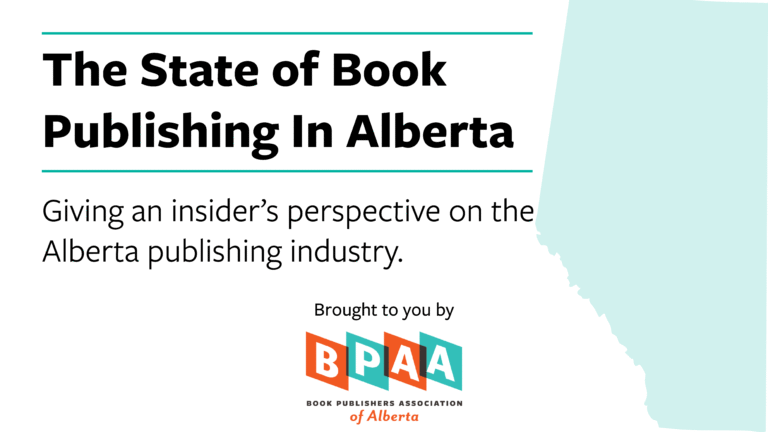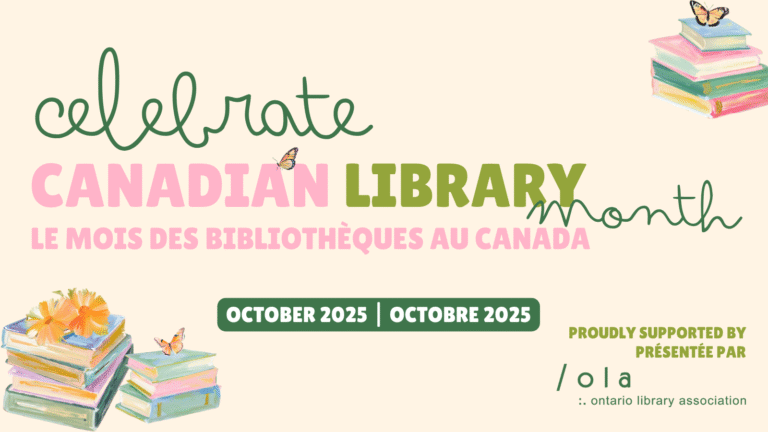
Home » Paper Birch Books: A conversation with Benjamin Hertwig and Céline Chuang
Share this post!
by Meredith Thompson
After offering me an absolutely delicious coffee, Céline Chuang, Benjamin Hertwig, and I settle outside of their small “mostly-used” bookstore, Paper Birch Books. Beside us, positioned outside the door and into the small square between the shop window and the main street, is a trolly of used books.

“Sorry, this chair is a little sad,” Céline immediately says, apologizing for the seat not being refinished yet. “They’re from old movie seats,” she explains, “that’s why they have numbers.” She points to the fading white number stamped on the back of each seat.
But the seats are far from sad. They are charming and unique. An excellent precursor for what I can see inside.
“We wanted to have something that we didn’t feel existed yet in Edmonton in terms of intellectual literary and theory based, subversive or transgressive works, translated works, underrepresented works,” Céline explains when I ask her to tell me a bit about the shop’s origin. “In particular, I think I have an interest in under-told or under-recognized voices. In queer literature, literature by racialized people, people on the margins of English-language writing.” Céline describes their curation style as “completing the canon,” a phrase she attributes to award-winning educator Felicia Rose Chevez.
“You can still find your Hemingways, your Fitzgeralds, your Shakespeares,” Benjamin adds. “All those works are considered canonical, and we have them.”
“All those guys,” Céline laughs, “but then we have other writers as well and a lot of contemporary writers, which some used bookstores don’t tend to feature. We wanted to bring in diverse editions and a love of print culture, so having different editions, different versions of a book…”
“…A $5 copy for kids to read and destroy and a signed copy for collectors, that sort of thing,” Benjamin finishes her thought. And yes, the shelves are full of tightly curated choices in a wide range of price points, from signed copies and first editions to pocket paper backs.
“We have some really nice Patricia Highsmith first editions right now, and then we often try to find paperbacks of The Price of Salt or other works that we want to carry. We are both interested in ephemera, so we try to keep a selection of vintage pocket paperbacks as well as collector editions or leather-bound books. The store is in a way a bit of a love letter to print culture.” Céline smiles, and I can see what she says is true. While the books that line the shelves are clearly intended for reading, there is also a sense of the book as art object about this place. Whether that means rare books or just interesting books, such as the red leather-bound Farmer’s Almanac I later discover at the top of a pile on the counter.
Paper Birch Books is located in Boyle McCauley, Edmonton’s Little Italy. Since they opened in December 2022, they have become a staple of this block. Giovanni Caboto Park is right next door and kitty corner from where we are sitting is the original Italian Centre Shop. “We wanted to build something in the neighbourhood where we live, a neighbourhood we love that still has a stigma attached to it,” Benjamin says. “We wanted to be here. To offer something for everyone in the neighbourhood. We have a community book fund, so if someone comes in wanting a book but doesn’t have the resources, we will not turn them away without a book.”
“There’s also our $5 bookshelf,” Céline adds, “so a lot of folks who may be low income or just can’t spend as much money on books, can still find still something they can look at.” Anyone can donate to the community book fund. “People can pay into the fund whatever amount they would like — $3, $5 … any amount really,” Céline explains. The fund is managed by the store and covers books or coffee. “It works as a suspended book and coffee fund, an idea which originated in working-class Naples, I believe, but we first saw it done in the downtown eastside of Vancouver…” Céline is interrupted incredibly graciously by someone I consider an Edmonton institution, the incomparable Michael Phair, who is in search of Benjamin’s book. Besides being co-owner of the bookstore, Benjamin is also the author of the City of Edmonton Book Prize-winning novel Juiceboxers, published by Alberta’s own Freehand Books.
While Benjamin goes inside with Michael, Céline continues. “The sense of helplessness seeing folks being hard-off and struggling and not having many places to turn to is a real feeling. And the community fund is one small way that people can ensure someone feels a little more welcome, has a little something for the journey or for their time in the neighbourhood.”

Céline and Benjamin are clearly incredibly passionate and knowledgeable. As partners in both life and business, they are intentional members of their local community not only as business owners but as residents, employers, employees, regular customers of other local businesses, and engaged citizens.
“We also recognize that we are part of a system,” Benjamin says when he gets back. “We pay our staff a living wage. We very consciously try to provide labour conditions that are fair and life-giving for our employees and recognize that people want to support that. People want to support a place where employees are treated well where it’s not all about profit.”
Recently, they’ve added coffee to the repertoire of offerings at the bookstore. The locally roasted Roasti Coffee could rival any offered by the best cafés in Edmonton. “We ourselves wanted this style of coffee — a more specialty third-wave style, and there’s nothing like it in our immediate vicinity. We thought, we want this kind of coffee, and others might want some as well.” Céline shrugs. They have become a much-loved stop on the locals’ neighbourhood meanders. “When we first opened, there was a young family who used to come in with their baby in a carrier and now that baby is walking and talking,” Céline says, smiling.
Along with the coffee, they have also recently added new books to their previously entirely used-book collection.
“We pick up every copy of Octavia Butler, James Baldwin, Ursule Le Guinn, or Angela Davis that we find but it’s hard to keep those in stock second-hand,” Benjamin explains. “We never want to be empty-handed when it comes to certain authors that we think are and should be celebrated.”
“Some newer queer books especially are hard to find used,” Céline adds. “We have a lot of new books that are about leftist political theory.”
“Contemporary books about Palestine, which are hard to find used.”
“We kept thinking, this is important and we want to bring in these specific books by these specific writers and we can make it happen now, so we started getting into new books, which is very different than used books, at least the procurement.” Céline says.
“Céline has done that work almost exclusively,” Benjamin interjects. “Setting up accounts with major distributors is not a simple process.”
Céline is clearly an experienced and tireless project manager and was instrumental in arranging the recently held Edmonton Indie Bookstore Extravaganza.
I ask them a bit more about their curation process, their procurement practice, and how they choose what sits on their shelves. The shop is small, but Céline and Benjamin have maximized the space with shelves that reach to the ceiling — you need a ladder to reach the very top ones. As someone who avoids heights, I can only imagine the vertigo created by being that high up. Still, choices need to be made about what is in the shop and what is not.
“You will always have people trying to police what you stock,” Benjamin says. “But I think we’ve identified ourselves as a little lefty used bookstore.”
“Not all of our customers necessarily align with those values. We have a lot of people that just come into the store because we do have books that they like as well.” Céline looks at Benjamin as she completes her thought, “But I think that as a bookstore, as well as personally, those are our values and that definitely affects the books that go on the shelf or the authors we do not stock. Selecting which books to stock is always a political choice.”
I ask them about competition, about encroaching behemoth corporate booksellers, as well as the windfall of independent bookstores in Edmonton.
“How do you compete with Amazon when Amazon is literarily in the business of putting bookstores like ours out of business?” Benjamin shakes his head. “But we don’t see other bookstores in Edmonton as our competitors. The more independent bookstores in the city the better.”
“It’s not necessarily the direct competition of people choosing to buy a book on Amazon either,” Céline clarifies, “but people expecting the same price or the same delivery time. I think it’s just about changing expectations. But there is also, I would say, a significant amount of people who intentionally want to support local bookstores.”

The interior of the bookshop is striking. The aesthetic of floor-to-ceiling shelves is complemented by a curated selection of art and décor pieces, like the movie theatre chairs, or the stained-glass window perched on top of the rare books shelf, which is positioned so that the ceiling lamp shines through the colourful glass. Paper Birch Books feels like something out of a work of fiction. As if a Parisian bookstore made its way to Edmonton, yet this bookstore feels vibrant and alive in a way those bookstores are not. Those shops have become monuments to the idea of books, places to be visited and paid reverence to, but not to be interacted with. Paper Birch Books, on the other hand, is a thriving and robust conversation in the present day, concerned with contemporary political events, human rights, human dignity, and sustainability.
“We used a lot of salvaged materials, materials that were already out in the world that have a story,” Céline says, “because that very much fits with the aesthetic and the values of the bookstore. Certainly, the design was very important in terms of our branding. The visuals of the store, the interior, we both really wanted it to feel a certain way. Having colours and odes to our cultural backgrounds are built into it. On our tote bag we have a lot of plants that are native to the region; we pay attention to and include parts of the land we were both raised on.”
Céline and Benjamin have always tried to let community needs guide their business. Used books led to coffee and a café, and the logical next step is events.
“We’ve hosted a wide variety of events, including a cellist and an accompanying pianist through the Chinatown Live Music Series. We’ve hosted naloxone trainings, as well as more traditional literary events like readings or launches, as we did for the latest poetry book by the incomparable Marilyn Dumont. We’ve had some talks as well, such as one with Jessica Johns and Chelsey Vowel around Treaty principles and Palestine; a gardening/ecological neighbourhood event about planting trees in the neighbourhood and different native species. We want to host events that we feel are important that contribute to our neighbourhood,” Céline says and Benjamin nods in agreement.
Edmonton is changing and people who would have otherwise moved away are staying and creating businesses like this. The city is in a state of flux and of transition.
“Younger people are deciding to call Edmonton home and are putting in the love and the work to make spaces that we care about and we want to have in our city,” Céline adds, “there’s a lot of possibility here.”
—♦—

About the Author
Meredith Thompson (she/they) is an Edmonton-based poet, essayist, and critic whose work can be found in Gutter Magazine, SPAM zine&press, Cloud Lake Literary, The Dallas Review, and more. Her experimental poetry pamphlet, A Topology of Being is available from Invisible Hand Press.

